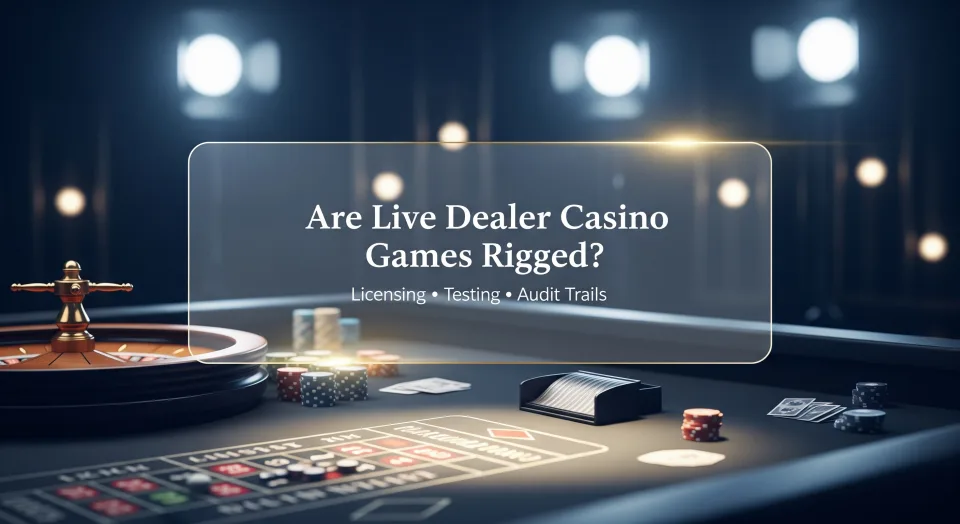Are live dealer casino games rigged? No—not at licensed casinos using reputable studios. Live dealer tables stream real wheels and real cards, captured by multiple cameras and logged round-by-round. The safeguards are layered: licensing, independent testing, sealed equipment and shufflers, strict dealing procedures, and complete audit trails.
How live dealer games actually work (why that matters for fairness)
A live table merges physical game hardware (wheel, card shoe) with a broadcast feed and your betting UI. Your wagers lock before the result; sensors and OCR record the outcome and reconcile payouts automatically. Because the outcome is physical, trust depends on studio controls and oversight—the core reason people ask are live dealer casino games rigged? in the first place.
Licensing & oversight (who polices live studios?)
To answer are live dealer casino games rigged, start with licensing. A legitimate operator lists a regulator and a license number you can verify on an official register such as the UK Gambling Commission public register. Studios are vetted too: procedures, staff training, and equipment controls sit under that regulatory umbrella.
Independent testing & audits (the lab layer)
Beyond regulators, credible studios use recognized third-party testing. A well-known example is the independent testing lab eCOGRA, which certifies game systems, shufflers, and operational controls. Labs validate shuffle protocols, sealed decks, wheel maintenance, and change controls so no one can quietly alter the setup.
Shuffles, card shoes, and wheel maintenance (practical safeguards)
For blackjack, baccarat, and poker variants, fairness rides on proper shuffles and controlled deck cycles. Studios use automatic shufflers with sealed cassettes or multi-pass manual shuffles on camera; shoes are tracked and swapped regularly.
For roulette, balanced wheels, fixed camera angles, and calibrated sensors protect integrity. If you’re still wondering are live dealer casino games rigged, remember: disputes are resolved by reviewing the video + sensor logs for the exact round ID.
What the audits actually check
-
Dealer procedures: cuts, burns, dealing order, spin launches, and error handling.
-
Equipment control: wheel inspections, shuffler calibration, deck integrity, seal records.
-
Round reconciliation: round IDs, bet logs, outcomes, payouts, timestamps.
-
Change management: any software, layout, or hardware change requires logged approval.
These controls make it extremely hard for a licensed studio to rig outcomes without leaving forensic footprints.
Common myths (and reality)
-
“The dealer decides who wins.” Dealers follow rigid, recorded procedures; outcomes come from physics, not dealer intent.
-
“They tweak results if most bets pick one side.” Bets lock before results; the studio can’t alter a physical spin or card order after lock.
-
“Live roulette uses an RNG.” Live roulette outcomes come from the wheel; RNG applies to virtual tables.
Verifying a trustworthy live table (simple checklist)
-
License line + number: verify on a public register (e.g., the UKGC register).
-
Provider identity: reputable studio branding in the UI or info panel.
-
Game info: rules, limits, payout tables, and a nod to independent testing (e.g., eCOGRA).
-
Feed quality: consistent camera angles; shuffles and spins remain in view.
-
Cashier test: do a small deposit/withdrawal test; ask support a rules question—answers should match the Terms.
If something feels off (what to do)
-
Capture the round ID and timestamp.
-
Contact support and request a round audit (they’ll pull the video and logs).
-
Escalate via ADR if needed; licensed sites publish an official dispute route.
-
Protect your bankroll: use timeouts and deposit limits so a disputed round doesn’t trigger tilt.
Red flags (choose another table if you see these)
-
No regulator or license number (only a vague “licensed” logo).
-
Hidden studio identity; no info panel explaining procedures.
-
Camera work that hides key actions (cards off-screen during shuffles).
-
Slow or evasive support, especially about rules or audits.
-
Bonus terms that block withdrawals without clear wagering explanations.
Live dealer vs virtual tables (which is “fairer”?)
Both can be fair when licensed and tested. Live dealer uses physical randomness (wheels, cards) with cameras and sensors; virtual tables use certified RNGs. The better choice depends on your pace and table rules—not on whether live dealer is rigged.
Bankroll & table selection tips (keep sessions calm)
-
Prefer European roulette (single zero) when available.
-
Avoid the American roulette five-number bet (0-00-1-2-3)—its edge spikes.
-
Blackjack: basic strategy + friendly rules (S17, doubles, splits) lowers the edge.
-
Baccarat: stick to Banker/Player; treat side bets as entertainment.
FAQs — Are live dealer casino games rigged?
Are live dealer casino games rigged at reputable brands?
No. Licensing, independent testing, controlled equipment, and round logs protect fairness.
Can studios stack a shoe to cheat?
Sealed decks, on-camera shuffles, and audits make manipulation detectable and sanctionable.
If I think a round was wrong, can the casino check?
Yes—submit the round ID/time; support can review video and sensor logs and escalate to ADR.
Is virtual (RNG) blackjack less fair than live?
Not when licensed and tested; it’s different (RNG vs physical cards).
Bottom line: so… are live dealer casino games rigged?
At licensed casinos using reputable studios, the answer is no. Multiple layers—regulators, labs, sealed equipment, strict procedures, and round logs—keep outcomes fair. If any safeguard is missing, move on; there are plenty of verified tables where you can play with confidence.

